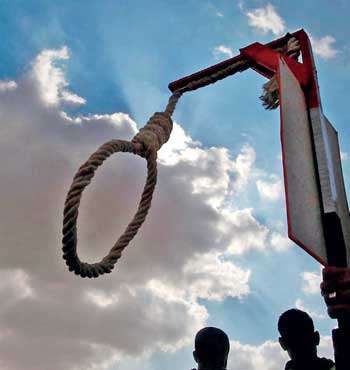07 Aug 2018 - {{hitsCtrl.values.hits}}
 Information has begun to trickle into the public domain of the UK having agreed to the prosecution of two British terrorists in the USA. Britain’s concurrence is not conditional to the two terrorists not being executed if found guilty.
Information has begun to trickle into the public domain of the UK having agreed to the prosecution of two British terrorists in the USA. Britain’s concurrence is not conditional to the two terrorists not being executed if found guilty.
Britain abolished the death penalty in 1965, but it remained a legally defined punishment for crimes such as treason till its complete abolition in 1998. It is a signatory to the 2004 13th Protocol of the European Convention on Human Rights which prohibits all members from the practice of capital punishment.
 The Beatles is an all British ISIL terrorist cell dubbed after the famous British pop group due to their English accents.
The Beatles is an all British ISIL terrorist cell dubbed after the famous British pop group due to their English accents.
They were named ‘John,’ ‘Paul,’ ‘George,’ and ‘Ringo’ by their prisoners. The leader was known as ‘Jihadi John.’ Video recordings are available of the group beheading at least 27 hostages including two American journalists and two British aid workers in 2014. They were tasked with guarding over 20 western hostages in Raqqa and are known to have resorted to very harsh methods of interrogation such as mock executions and waterboarding.
Mohammed Emwazi a.k.a. Jihadi John was killed in a US drone attack on November 12, 2005. Alexanda Kotey dubbed Ringo, a 32-year-old convert from London and El Shafee Elsheikh known as Goerge, a British citizen of Sudanese origin were apprehended by Syrian Defence Forces (SDF) in the Turkish border.
Aine Lesley Davis a.k.a. Paul, a Brit was convicted by a Turkish court and sentenced to seven and a half years in prison. Meanwhile, Britain has stripped them of their citizenship.
Britain and other EU member’s states should stop lecturing to Sri Lanka of the need to prosecute or release 70 some hardcore LTTE terrorists held since 2009
The current controversy revolves around the fate of Kotey and Elsheikh. Options available are; indefinite detention in Guantanamo Bay Detention Camp (GTMO) or transfer to International Criminal Court which might not be plausible as the US government does not recognize ICC’s jurisdiction.
British Home Secretary Sajid Javid has dispatched a letter to US Attorney General Jeff Sessions dated June 22, admitting Britain’s legal processes are insufficiently robust and there is a good chance prosecution would fail.
Therefore, Britain would approve America’s request for “mutual legal assistance” for Kotey and Elsheihk. All available intelligence on the two terrorists to US Prosecutors without the caveat, the duo would not face the death penalty, currently forbidden in British and EU law.
Boris Johnson who resigned as Foreign Secretary recently over a policy disagreement on Brexit has reportedly expressed concerns. In an internal government briefing document, Johnson is known to have stated, “not seeking assurances ….. could damage our ability to secure adequate assurances from the US and other countries in the future but agrees that the benefits outweigh the risks in this instance.” He supposedly agreed to the Home Secretary’s recommendation on the basis “the benefits outweigh the risk of the two men returning to the UK. Should we prevent the men from being tried and brought to justice because of the risk of the death penalty?”
It was, but less than a decade ago, one of his predecessors David Milliband, accompanied by his French counterpart came charging to Colombo in May 2009 to save Velupillai Prabhakaran, one of the world’s most feared terrorists and his high command who had been encircled by the Sri Lankan Army.
Despite initial hesitations, Javid’s letter subsequently received Prime Ministerial concurrence. A release from Downing Street stated, “The ultimate aim of all of us is to ensure these men are brought to justice.”
It was a tacit admission, the justice the two terrorists would receive in a British court of law would be wholly inadequate.
Indefinite incarceration at GTMO or prosecution in a US court which could result in the death penalty was the justice desired by the British Government.
Even though it was a violation of Britain’s stated policy on capital punishment, Javid dispatched the letter without public or Parliamentary consultation.
Human Rights groups, as well as a cross-section of Tory, Labour, and LibDem MPs, expressed outrage over the government’s decision. One parliamentarian stated, “we have to show we are better than Islamic State in our morals and should, therefore, have nothing to do with capital punishment.”
Britain is required to uphold EU law at least till March 29, 2019. EU law is notoriously more concerned of terrorist’s rights than those of ordinary citizens. It is symptomatic of the problems western liberal democracies face in dealing with terrorism at home.
On the other hand, many among the British establishment expressed a counter view. Former Home Secretary Amber Rudd, head of MI5, Lord Chief Justice and head of counter-terror policing have said, Britain’s archaic treason laws need to be updated and used to prosecute jihadis who have fought in Syria.
The Treason Act of 1351 has not been used since 1946 but should now be revised to prosecute terrorists amid growing fears that British laws are currently not robust enough to deal with returning jihadis.
A former chairman of COBRA Intelligence Group, the British government’s top-level crisis-management group, has opined, “Of course both execution and detention without a trial run contrary to British ethical principles. But history proves that, in times of war, we must sometimes adapt our values to secure victory.
Even today, some have difficulty in comprehending that, because this is not a conventional war with tanks rolling across the plains and dogfights over the skies.”
The relevance of this episode to Sri Lanka is twofold.
Sri Lanka is currently divided over President Sirisena’s plan to impose the death penalty for those repeatedly convicted for drug trafficking.
Whereas rights groups and some in civil society are opposed to the idea, it would appear the general populace is supportive of the move.
INGOs, NGOs, and the European Union have waded into the issue by publicly voicing their opposition to the President’s plan.
Firstly, this is not of the rights and wrongs of the death penalty. It is about the right of the people of this country to be able to decide on their own, if death penalty, may it be for terrorism, drug trafficking, or any other reason need be reinstated or not.
Sri Lanka is currently divided over President Sirisena’s plan to impose the death penalty for those repeatedly convicted for drug trafficking
Sri Lanka, unlike Britain, does not have the luxury of outsourcing trials and executions of undesirables to another country, while preaching to the rest of the world of the evils of capital punishment.
Secondly, contemplating sending the two Jihadists for indefinite incarceration in Guantanamo detention facility or to the gallows without insisting on having the two terrorists, former British subjects, brought to the UK for prosecution under British law is but plain and straightforward humbuggery.
Britain and other EU member states should stop lecturing to Sri Lanka of the need to prosecute or release some 70 hardcore LTTE terrorists held since 2009.
The need for such detainees to be tried or released is a given.
However, it is not for other nations, especially those who twist international conventions when it suits them to pontificate to other countries how they should address their security, terrorism, and crime-related issues.
The US currently holds 40 detainees at GTMO without trial for over ten years. Britain has agreed to send two Jihadi terrorists, former British subjects for indefinite incarceration at Guantanamo or possibly to face the death penalty.
Meanwhile, there is no evidence of EU Ambassadors in London expressing their objections to Britain’s decision, as done by their counterparts in Colombo last week.
In this instance, the stance taken by both Britain and EU would appear to be, human rights, justice, and the law need be applied consistently according to international conventions when it involves other countries but may be sliced and diced to suit their own interests at home.
27 Jun 2024 38 minute ago
27 Jun 2024 3 hours ago
26 Jun 2024 8 hours ago
26 Jun 2024 9 hours ago
26 Jun 2024 9 hours ago